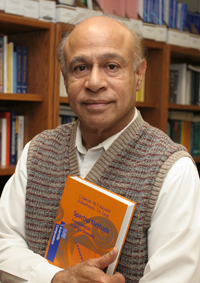
One of Florida State University’s most eminent scholars has been elected a fellow of the American Institute of Aeronautics and Astronautics.
M. Yousuff Hussaini, the Sir James Lighthill Professor, is one of 30 fellows and three honorary fellows elected for 2008. The AIAA bestows the distinction of "fellow" on members who have made notable and valuable contributions to the arts, sciences or technology in aeronautics or astronautics.
"I am honored and quite pleased with this recognition," Hussaini said.
As a leader in applied mathematics, Hussaini is most deserving of the AIAA honors, FSU Provost and Executive Vice President for Academic Affairs Lawrence G. Abele said. Hussaini will be recognized in May at a ceremony in Washington, D.C.
"Professor Hussaini is renowned for bringing new insights to a wide variety of problems, especially those in fluid dynamics, and devising very creative solutions that lead to real breakthroughs," Abele said. "He is enormously productive, training a large number of postdoctoral students and publishing at an almost unbelievable rate. He brings attention, prestige and honor to Florida State University."
Hussaini helped to establish FSU’s School of Computational Science and was given the honorary title of founding director. Since coming to FSU in 1996, Hussaini’s work in computational aeroacoustics has culminated in the correct prediction of the noise spectrum of a chevron nozzle, a high-technology noise suppression design used in such state-of-the-art aircraft as the forthcoming Boeing 787.
His work in the field of cryogenics may have ramifications for fuels that will propel far-future generations of spacecraft, and his work in the nanofluid field has focused on application of nanotechnology that has relevance to cleaning critical particle contamination of space optics, semiconductor devices, magnetic hard disk read heads and other micro-devices. His ongoing research program in nanomaterials comprises experiment, theory and large-scale computation, which may pave the way for new nanoscale systems and composite materials for space radiation shielding, photovoltaic cells, blast-resistant armors and enhanced thermal conducting films for microchip cooling.
Hussaini has published more than 200 articles, co-authored three books and edited or co-edited 20 volumes. He is editor-in-chief of Theoretical and Computational Fluid Dynamics, and editor of Applied Numerical Mathematics; Concurrency and Computation; and Computing in Science and Engineering. He is an associate editor of Journal of Turbulence.
He also is an editor of the Springer-Verlag Series on Scientific Computation and the Oxford Engineering Science Series and associate editor of the WIT Press series on Advances in Fluid Mechanics. He is a fellow of the American Physical Society and the Institute of Physics and a member of the Society for Industrial and Applied Mathematics.
Before coming to FSU, Hussaini was the director of the Institute for Computer Applications in Science and Engineering (ICASE) at the NASA Langley Research Center in Hampton, Va. He received his doctorate in engineering from the University of California at Berkeley in 1970 and his bachelor’s and master’s degrees in mathematics and physics from the University of Madras in India.
The American Institute of Aeronautics and Astronautics advances the state of aerospace science, engineering and technological leadership. The Institute serves more than 35,000 members in 65 regional sections and 79 countries. The AIAA membership is drawn from all levels of industry, academia, private research organizations and government.




